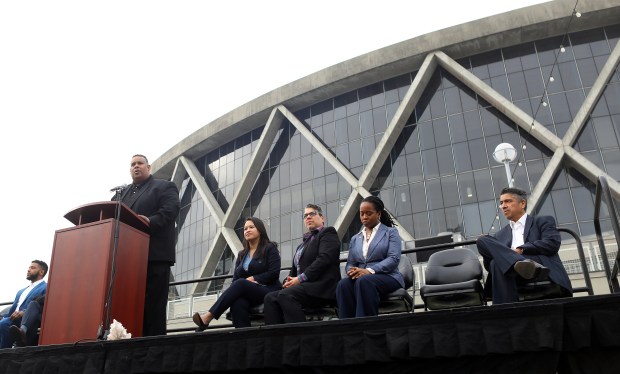OAKLAND — A Black-led, local development group has formally offered to buy out the A’s partial ownership share of the Coliseum, proposing to take one of Oakland’s most notable pieces of real estate off the team’s hands in order to revitalize the property.
In an offer letter, the African American Sports and Entertainment Group (AASEG) describes its interest in “expediting the future redevelopment” of the 155-acre Coliseum complex, which includes the baseball stadium and the Oakland Arena, plus the vast parking space in between.
AASEG sent the letter earlier this week to the A’s, as well as to numerous city and Alameda County officials. It did not name a price, but offered instead to engage in negotiations with the franchise over the terms of a potential buyout, noting the team’s intentions of constructing a new Las Vegas ballpark by 2028.
Amid public overtures by Mayor Sheng Thao to keep the A’s in town for as long as possible, this new offer indicates that AASEG doesn’t want its vision for the Coliseum site — involving retail, nightlife and the hope of a WNBA team — to be jeopardized by the team extending its stay for too long.
AASEG believes their acquisition of the property would “deliver essential advantages to the East Oakland community and aid in the overall economic recovery of the region, especially after the A’s relocation to Las Vegas,” the group’s co-founder, Oakland native Ray Bobbitt, said in the letter.
The A’s acquired 50% of the property rights to the Coliseum complex for $85 million from Alameda County in 2019, hoping the land could be a failsafe as the team sought to build a ballpark elsewhere.
Meanwhile, city officials in February entered negotiations with AASEG over a $5 billion redevelopment of the East Oakland property that ultimately would lead to the group acquiring the city’s own half of the Coliseum’s ownership share for a $115 million price tag.

Among the partners involved in the AASEG consortium are a flagship group of Oakland-based decision-makers led by Bobbitt; a land development team also managed by Bobbitt and another local resident, Alan Dones; a Black-owned investment firm, Loop Capital, which manages funds worth billions of dollars; and prominent sports agent Bill Duffy.
Retired WNBA star Alana Beard has partnered with the organization to help lure a women’s professional basketball franchise to Oakland, reviving hope among residents that professional sports have a future in this town.
AASEG is also on cooperating terms with the popular minor-league soccer franchise Oakland Roots SC, which is in discussions with the city about whether the team could feasibly build a temporary soccer stadium in one of the stadium’s parking lots.
A’s management has spent recent years disparaging the Coliseum ballpark, a brutalist concrete structure that has fallen into disrepair, sewage issues and possum infiltrations. The team itself is the worst in Major League Baseball, with the lowest payroll of all 30 franchises.
Despite all this, wealthy A’s owner John Fisher has given no indication that he’d be amenable to a buyout of his share of the property, even as he appears set on a Vegas relocation.
The team is on the hook to find a ballpark by January 2024 or risk losing important millions in revenue-sharing guaranteed by the MLB.
Given that urgency, Bobbitt’s letter notes, the team said back in February it “could not commit to any meaningful discussions or planning with AASEG” until that time.

If the franchise refuses AASEG’s offer outright, it could pose a major hiccup to the group’s redevelopment plans, the first milestone of which is to work out some kind of resolution with the A’s so the Coliseum’s land title could be cleared.
Meanwhile, Mayor Thao is still hoping Oakland can retain a role in the team’s future, offering a lease extension at the Coliseum until 2028 in exchange for the franchise staying in perpetuity — or at least leaving behind its name for a future MLB expansion team.
Leigh Hanson, the mayor’s chief of staff, said in a recent interview a lease extension would not interfere with AASEG’s ability to develop the Coliseum site. There’s also no direct conflict presented by the city’s public bargaining with the A’s, she said, because AASEG has yet to enter terms to actually take over ownership of the city’s property share.
“Most mega-projects like this one take many years of pre-planning before there’s any actual construction,” Hanson said.
Bobbitt and other AASEG leaders declined interview requests, citing an agreement with the city not to speak to the media during negotiations.
Amid the uncertainty around the Coliseum stadium, the Oakland Arena has fared well on the same property, reporting its most successful grossing year in 2022 with 65 concerts.
Community leaders, including those involved in AASEG’s voting core, have said they want to restore the Coliseum to an earlier state of pride and remedy the economic struggles and trauma from violence in surrounding deep East Oakland. Thao has predicted AASEG would bring 30,000 new jobs to the community.
Still, for the Coliseum’s present stewards, there’s a lot to be wary about — Oakland’s taxpayers, for instance, are still paying off nearly 30-year-old upgrades to the stadium and arena that in the 1990s helped return the Raiders football team, which has since left again for Las Vegas.
“The city and county have had to subsidize these teams — that money could’ve gone to parks, recreation and libraries in our lowest-income communities,” said Henry Gardner, head of a joint authority that manages the Coliseum. “We don’t make a single cent in net revenues from the A’s.”
Source: www.mercurynews.com
